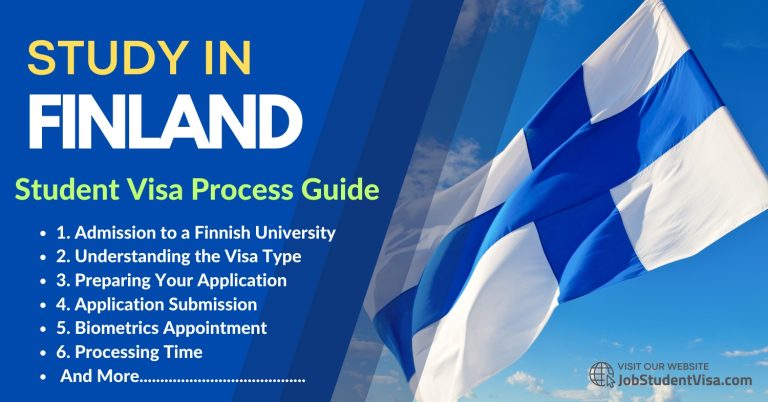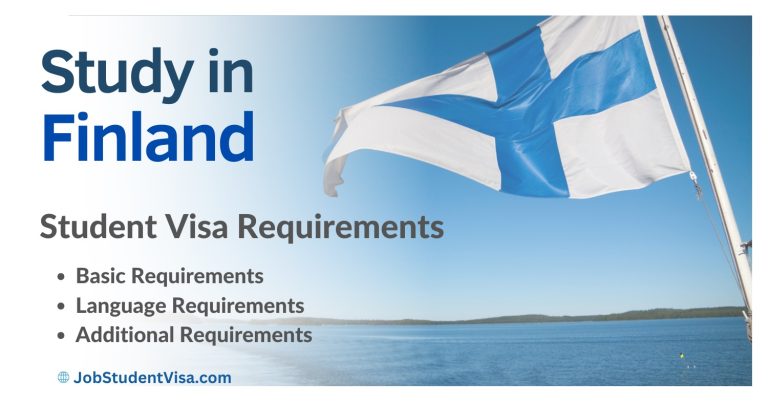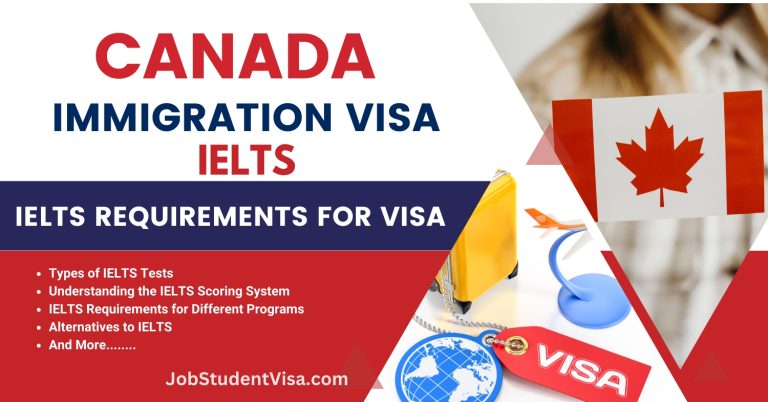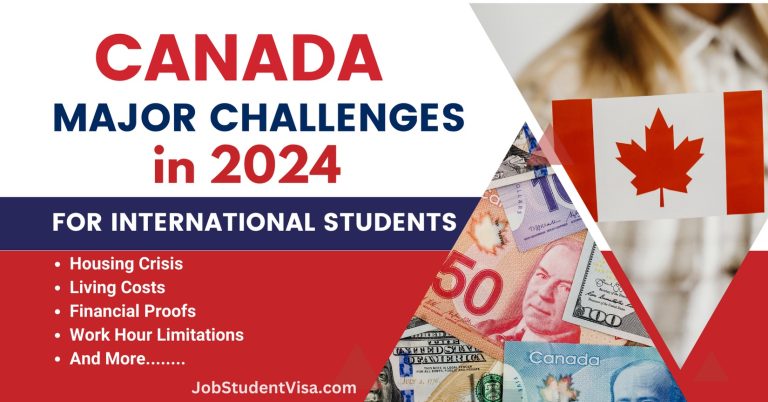Canada’s New Immigration Strategy for 2024: Limiting the Post-Graduation Work Permit (PGWP) and Spouse Work Permit
Canada Introduces Key Changes to Post-Graduation Work Permit (PGWP) Eligibility for International Students from 2024
As 2024 approaches, international students aspiring to pursue their education in Canada are facing new challenges due to significant policy changes announced by Immigration, Refugees and Citizenship Canada (IRCC). These adjustments, particularly impacting the Post-Graduation Work Permit (PGWP) program, mark a notable shift in Canada’s approach to international education and work opportunities for students, especially those interested in Master’s programs. With a cap on study permits and a standardized three-year duration for the PGWP for Master’s students, these changes represent a tightening of immigration policies that have long made Canada an attractive destination for global learners.
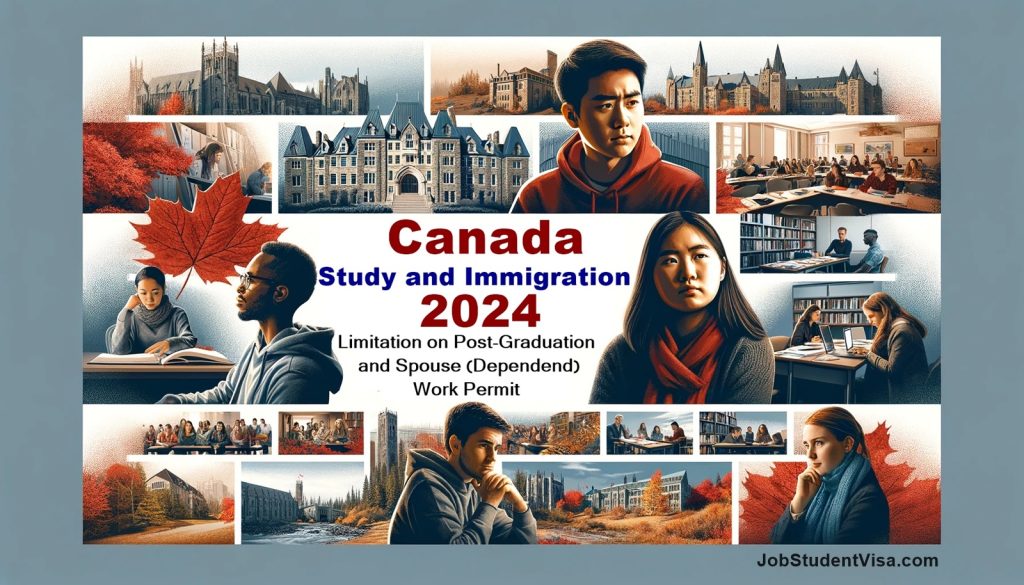
Historically, Canada’s education system has been a magnet for international students, offering high-quality academic experiences combined with opportunities for post-study work and potential pathways to permanent residency. However, the policy overhaul for the year 2024 introduces a new dynamic, bringing with it a degree of uncertainty and complexity for those planning their educational futures in Canada. These regulatory changes, aimed at balancing the influx of international students with the broader needs and resources of Canadian society, underscore the need for prospective students to adapt and strategically navigate the evolving landscape of Canadian immigration and education policies.
In a significant move that will reshape the landscape for international students in Canada, Immigration, Refugees and Citizenship Canada (IRCC) has announced pivotal changes to the Post-Graduation Work Permit (PGWP) program. These amendments, effective from September 1, 2024, notably exclude students graduating from public-private partnership institutions from being eligible for the PGWP.
Marc Miller, Canada’s Immigration Minister, emphasized the rationale behind these reforms as a bid to maintain the integrity of Canada’s immigration system and to offer a balanced approach that benefits both international students and the Canadian community at large. This decision comes amidst growing concerns over the rapid increase in international students, which has exerted pressure on housing, healthcare, and other services in the country.
Under the current framework, the PGWP allows graduates from designated Canadian institutions to gain valuable work experience in Canada, often seen as a stepping stone towards permanent residency. However, the revised policy will see a significant shift, particularly impacting those enrolled in programs offered through public-private partnerships. These institutions have witnessed a substantial influx of international students in recent years and, according to IRCC, have less regulatory oversight compared to public colleges.
The announcement is part of a broader strategy by the Canadian government to reform its international education sector. Alongside the PGWP changes, Canada has also introduced a two-year cap on new study permits, with an expectation of approving around 360,000 applications in 2024, a 35% decrease from the previous year. This measure, however, exempts postgraduate students and those in elementary or secondary education.
While this policy change is poised to impact future international student admissions, the Minister has assured that current students and pending applications for study permit extensions will not be affected.
Furthermore, in a move to provide a more enriching academic experience, the duration of the PGWP for master’s degree students will be extended to three years starting this September. This adjustment addresses the previous limitation where the duration of post-study work was tied to the length of the study program, often disadvantaging master’s students.
These reforms reflect Canada’s commitment to ensuring a sustainable, balanced, and fair approach to international education and immigration. While bolstering the quality and integrity of the educational experience for international students, these changes also aim to protect the Canadian labor market and public resources.
For international students planning to study in Canada, these developments underscore the importance of staying informed about the evolving immigration policies and choosing educational pathways that align with their long-term goals in Canada.
As international students plan their educational journeys to Canada, these developments underscore the importance of staying informed about evolving immigration policies and choosing educational pathways aligned with their long-term goals in the country.
Tightening Oversight: Canada Revises PGWP Regulations Affecting Public-Private Partnership Graduates and Spouse Work Permit
The year 2024 brings transformative shifts in Canada’s immigration policies, particularly impacting international students aspiring to pursue education in the country. Notable changes, spearheaded by the Immigration, Refugees and Citizenship Canada (IRCC), focus on the Post-Graduation Work Permit (PGWP) program, marking a departure from historical norms. These adjustments include excluding students from public-private partnership institutions from PGWP eligibility, introducing a two-year cap on new study permits, and extending the PGWP duration to three years for Master’s students. Motivated by a need to balance international student influx with broader societal demands, these policy reforms signal a nuanced approach by Canada, prompting strategic decision-making for prospective students.
Here’s a table outlining the key differences between the previous and current policies regarding Canada’s Post-Graduation Work Permit (PGWP) program:
| Aspect | Previous Policy | Current Policy (Effective from September 1, 2024) |
|---|---|---|
| Eligibility for PGWP | Available to graduates from all designated institutions, including public-private partnerships | Excludes graduates from public-private partnership institutions |
| Cap on Study Permits | No specific cap on study permit approvals | Cap introduced, approximately 360,000 approvals expected in 2024 (35% decrease); excludes postgraduate, elementary, and secondary students |
| Duration of PGWP for Master’s Students | Based on the length of the study program | Extended to three years, regardless of program length |
| Work Rights for Dependents | Open work permits available for dependents of all international students | Open work permits will now only be granted to spouses of master’s and Ph.D. international students. Those in lower-level programs, such as undergraduate and college programs, will no longer qualify. |
| Provincial Attestation for Study Permits | No requirement for provincial attestation | Requirement for a ‘provincial attestation’ with study permit applications |
| Impact on Current Students and Applications | Not applicable as policy was not yet in place | Current students and pending applications for study permit extensions unaffected |
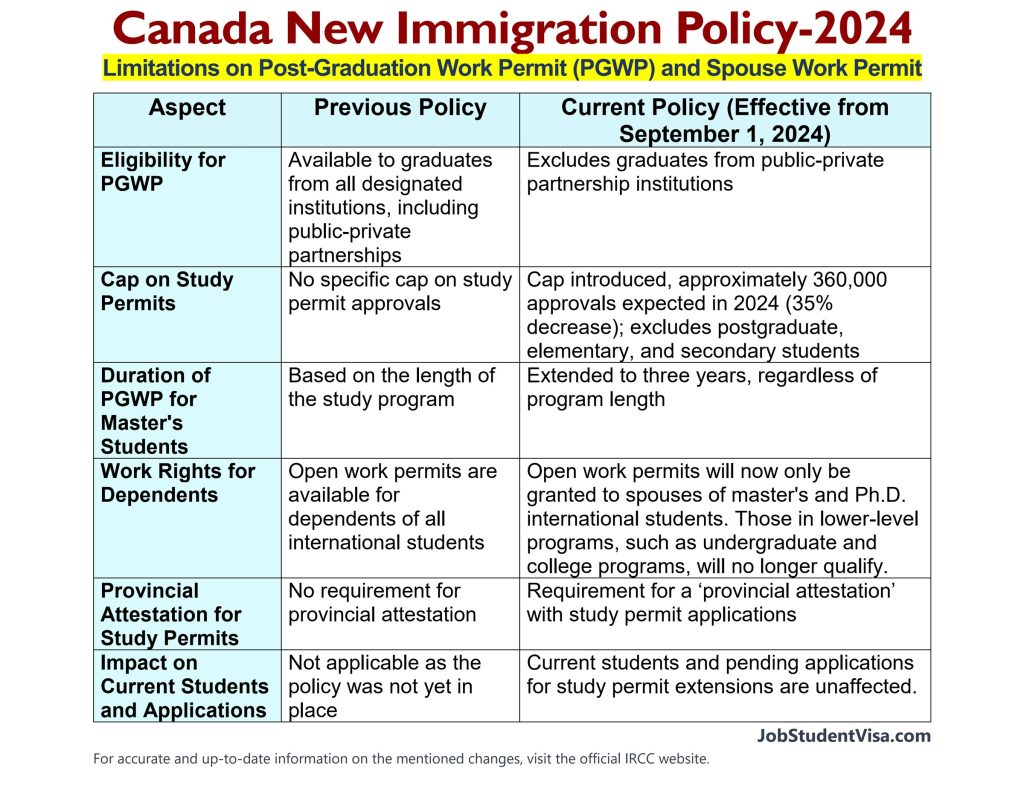
This table presents a clear comparison of the key aspects of the previous and current policies related to the PGWP program in Canada. It highlights significant changes, especially in eligibility criteria, permit caps, and the conditions for dependents of international students.
For more detailed information and updates on these changes, visit the IRCC’s official website and press conference.
Click here to read the IRCC release regarding the issue
Disclaimer: The information provided in the preceding text is fictional and created for illustrative purposes only. Any resemblance to real events, policies, or announcements is purely coincidental. The content does not represent actual developments in Canadian immigration policies or any other domain. For accurate and up-to-date information, individuals are strongly advised to consult official government sources, legal professionals, or relevant authorities. Any decisions or actions based on the content are at the reader’s discretion, and the author and platform do not assume any responsibility for inaccuracies or consequences resulting from the use of the fictional information provided.

